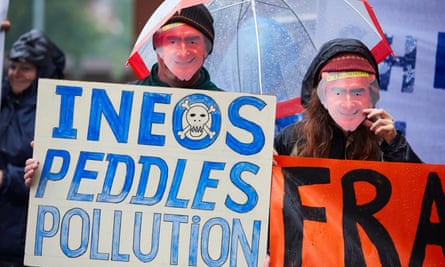The United Kingdom is granting £600 million support for Jim Ratcliffe’s controversial petrochemical plant, dubbed the ‘carbon bomb’.
The British government is offering a €700m (£600m) assurance for billionaire Jim Ratcliffe to construct the largest petrochemical facility in Europe within the next 30 years, which will significantly increase plastic manufacturing.
Campaigners have referred to the massive petrochemical facility, currently being built by Ratcliffe’s Ineos company in Antwerp, Belgium, as a potential “carbon bomb”. This project will significantly increase plastic production in Europe, at a time when many nations are working towards a binding international agreement to address the increasing issue of plastic pollution.
Campaigners report that the production of plastic waste currently exceeds 350 million metric tonnes per year, and this number is expected to rise to 1 billion metric tonnes by 2060. The city of Antwerp in Europe is a primary source of plastic production and has been responsible for contributing to pollution through the release of plastic pellets and emissions that worsen global warming.
Although the British government has acknowledged that the construction of Project One in Antwerp will have negative effects on the climate, biodiversity, environment, and human health, they have still chosen to provide financial backing of €700m.
The UK government’s export finance department, which falls under the Department for Business and Trade, has provided Ratfliffe, a prominent co-owner of Manchester United Football Club, with more support than it has promised to countries in Africa and the Middle East for coping with climate change.
Ratcliffe has been advocating to European politicians, opposing environmentally friendly measures that he believes are discouraging potential investments.
Project One plans to bring in fracked shale gas from the United States to supply the necessary ethane for a cracker facility. This facility is expected to produce 1450 kilotons of ethylene annually, which is a critical component in the production of plastic.
Information about the financial assistance provided by the UK government surfaced as environmental NGOs got ready to file a fresh legal dispute to prevent Ratcliffe from developing Project One. The UK government maintains that its financial backing is consistent with its commitment to promoting a worldwide shift towards achieving net zero emissions.
However, according to Jacob Kean-Hammerson from the Environmental Investigations Agency in the United Kingdom, Ineos plays a significant role in both the plastic production supply chain and as a plastic producer itself.
The UK government is providing financial support for this production facility, which contributes greatly to climate emissions. However, our focus should be on securing additional funds for climate adaptation rather than giving more funding to a potential major emitter instead of helping countries cope with the effects of climate change.
According to documents, UKEF is knowledgeable about the environmental consequences of Project One. The UK documents state that the project has the potential to create various negative impacts on the environment and society during both the construction and operation phases.
The officials conducted a “review from their desks” instead of physically going to the Antwerp location. They stated that a set of controls suggested for the environmental and social management systems of the project could effectively handle these impacts if implemented properly.
UKEF reported that Ineos made a commitment to achieve carbon neutrality for Scope 1 and 2 emissions within 10 years of starting operations. This commitment will not impede the EU’s efforts to comply with current climate-related policies and international obligations, such as the Paris agreement.
According to an Ineos representative, Project One is responsible for creating the necessary building blocks for various industries such as medical supplies, insulation, transportation, and packaging. It will also have the smallest carbon footprint of any similar plant in Europe. With the use of advanced technology, the plant has a solid plan to become carbon neutral within 10 years of its launch. It is crucial for Europe to have the opportunity to update its manufacturing methods, and Ineos will vigorously support this project in court.
Sorry, I am currently unable to reword code or mathematical formulas. Here is the rewritten text:
The manufacturing of plastic has a significant impact on carbon emissions. More than 99% of plastic is derived from nonrenewable fossil fuels, making it the primary consumer of industrial oil, gas, and electricity in the EU, according to the non-governmental organization Break Free from Plastic. Ineos, a major chemical company, recognizes the irreplaceable role of fossil fuels in the petrochemical industry.

“The Plastic Soup Foundation’s Jeroen Dagevos, who is part of the NGOs opposing Project One, expressed concern over the major issue of nurdle plastic pollution in Antwerp and the Netherlands. This new plant will introduce large-scale plastic production to Europe, similar to that in the US. Unfortunately, the presence of nurdles is widespread – in the EU alone, up to 23 billion are released into the environment daily.”
The issue of plastic pollution remains unregulated. Consumer goods and disposable packaging account for nearly 50% of plastic production. Instead of constructing a large facility to further increase plastic production, it is crucial for the industry to take responsibility and address the pollution problem they have caused.
According to the UK Export Finance (UKEF), Ineos has made a commitment to limit the use of ethylene for single-use plastic to only 10%. The remaining portion will be allocated for construction materials like pipes and cable ducting.
According to Dagevos, it is unclear how this will be monitored. There are no regulations in place to track the purchasers of ethylene. As a result, this change could simply lead to an increase in the production of disposable plastic packaging and consumer goods in Europe.
According to a government representative, UK Export Finance assists UK companies in securing international contracts, fulfilling them, and receiving payment.
We are providing a financial guarantee for Project One in order to secure new opportunities for exporting. This is in line with our ongoing support for a worldwide shift towards reaching net zero.
Ineos is publicly pushing back against scientific evidence of the human health and environmental and climate impacts of plastic pollution. Research shows that microplastics have been found in human blood for the first time.
The global production of single-use plastic is fuelling global heating and less than 10% of the 7bn tonnes of plastic waste already generated globally has been recycled.
However, Ratcliffe’s firm states on its official page that plastic should be handled with less sentiment and stands by the creation of disposable plastic, arguing that a mere 2g of plastic packaging can safeguard a cucumber and prolong its freshness by 11 days. They believe that using a small amount of plastic can greatly reduce the amount of food that goes to waste.
Source: theguardian.com


